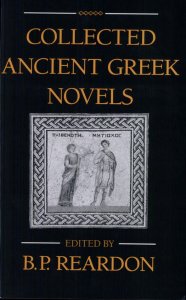 We are looking at the gospel narratives in their literary-narrative context. First we saw a tale of an empty tomb; then we noticed several instances of innocent heroes surviving crucifixion, and now we see how viable the notion of a bodily resurrection from the dead was.
We are looking at the gospel narratives in their literary-narrative context. First we saw a tale of an empty tomb; then we noticed several instances of innocent heroes surviving crucifixion, and now we see how viable the notion of a bodily resurrection from the dead was.
Maybe you have sometimes heard a scholar declare that the very idea of a physical resurrection was unthinkable, certainly abhorrent, to people in the ancient Greco-Roman world. Well, that’s simply not so, as the following details from a late second century novel testify. The novel is Leucippe and Clitophon, by Achilles Tatius.
The reader shares the view of the narrator witnessing the sacrificial death from afar off. (Heard that one before?) The body even becomes a sacrificial meal.
We could in fact see brigands aplenty and fully armed standing on the opposite side of the trench. They had improvised an altar of earth and near it a coffin. Two of them were leading a girl to the altar with her hands tied behind her back. I couldn’t see who they were in their armor, but I did recognize that the maiden was Leukippe. They poured a libation over her head and led her around the altar to the accompaniment of a flute and a priest intoning what I guessed was an Egyptian hymn — at least, the movements of his mouth and the distention of his facial muscles suggested that he was chanting.
Then at a signal they all moved far away from the altar. One of the attendants laid her on her back and tied her to stakes fixed in the ground, as sculptors picture Marsyas bound to the tree. He next raised a sword and plunged it into her heart and then sawed all the way down to her abdomen. Her viscera leaped out. The attendants pulled out her entrails and carried them in their hands over to the altar. When it was well done they carved the whole lot up, and all the bandits shared the meal.
As each of these acts was performed, the soldiers and the general groaned aloud and averted their eyes from the sight. But I, contrary to all reason, just sat there staring. It was sheer shock: I was simply thunderstruck by the enormity of the calamity. Perhaps the myth of Niobe was no fiction after all: faced with the carnage of her children, she felt just as I did, and her emotional paralysis had given the appearance of petrifaction.
When the ceremony was concluded, so far as I could tell, they placed her body in the coffin, covered it with a lid, razed the altar, and ran away without looking behind them. All this was done according to the rubrics sanctioned by the priest. (Book 3, Section 15)
Clitophon is so distraught over what he has just witnessed that he prepares to kill himself:
At some point during the first night watch, having waited until every- one was asleep, I went out with my sword, intending to kill myself by the coffin. When I reached it, I drew my sword and said: “O poor Leukippe, least happy of all human beings! I do not mourn merely the fact of your death, nor its alien milieu, nor its violence, but rather the farce your murderers made of your misfortune, that you were an expiation for those execrable bodies, that they slit you (alas!) alive, witnessing your own incision. They took communion of the secrets of your stomach and left what was left of you on an abject altar and bier. Your body is laid out here, but where will I find your vitals? Oh, far less devastating had the fire devoured them, but no — your insides are inside the outlaws, victuals in the vitals of bandits. (3.16)
But wait! Good news is promised. . . . Continue reading “Bodily Resurrection in Ancient Fiction”
